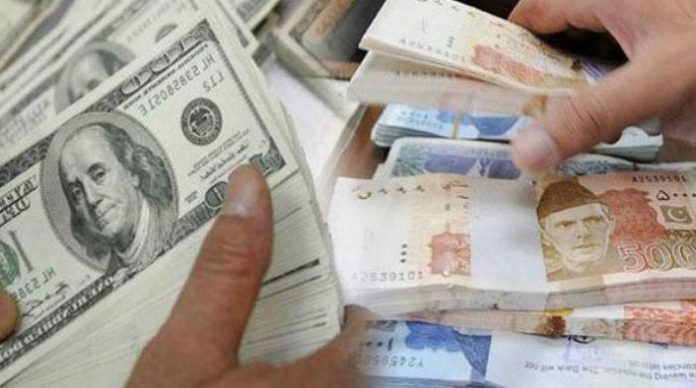LAHORE: The State Bank’s move to devalue the rupee by 3.6 per cent on Monday did not surprise experts; however, they suspect deficit risk to reflect the possibility of further devaluation.
While talking to Pakistan Today, experts unanimously agreed that all eyes were now on the new revenue measures to address increasing deficit pressure faced by Pakistan.
The central bank let the rupee devalue by another 3.6 per cent to Rs119.8 on Monday that went a step ahead on Tuesday, following two similar episodes in December 2017 and March 2018. The latest move follows the release of expected trade deficit for May 2018, the tenth month of fiscal 2018, with imports showing no sign of relenting despite devaluation and host of import restrictive measures in the second half of fiscal 2018. The trade deficit for the tenth month came in at $3.76 billion that was $34 billion more than 13 per cent. Meanwhile, remittances declined by 5 per cent to $1.77 billion.
Economic experts, Dr Ashfaq Hassan Khan and Dr Qaisar Bengali had earlier highlighted the possibility of at least 5 per cent devaluation while talking to Pakistan Today.
Dr Qaisar Bengali was of the view that the caretaker setup would not be able to address economic concerns, while highlighting that risk of slow response to the current economic challenge was well understood. He voiced that recent volatility is more of a function of continued concerns on external account and risks from recent budgetary measures and devaluation.
The need for strong steps from finance minister cannot be overstated here to keep the ship steady during the period leading up to the general elections. However, Dr Qaisar Bengali did not suggest any other option for the caretaker setup while Dr Ashfaq Hassan Khan urged the interim government to consult experts.
On budgetary front, other experts believe economic managers under the interim government would have to play a part in controlling the fiscal deficit, by restricting PSDP expenditure, rolling back some relief measures and slowing progress on ongoing projects. A swift move on increasing the petroleum product prices by significant 4-7 per cent should be seen as a necessary evil, though the same remains deeply unpopular among masses ahead of Eid.
Latest data for the ninth month suggests a big jump in fiscal deficit to 4.3 per cent which the experts believe might close the year at 6 to 6.25 per cent by yearend against the target of 5.5 per cent of fiscal 2018.
Experts highlight that slow-down in spending during June and July also remain crucial to provide a breather to the external account. Meanwhile, State Bank of Pakistan (SBP) in its response stressed the need to contain external account imbalance via latest market-driven exchange rate adjustment and other policy measures.
Latest data points on FX reserve and CAD data and no major change in initial budget proposals have further stirred up these concerns. Clarity on both issues remains crucial for the economy to come close to repeating past feats. To experts, the political risk associated with upcoming elections, though important, is clearly seen in the context of smoother economic policy steering environment, given growing risk to the external account.




